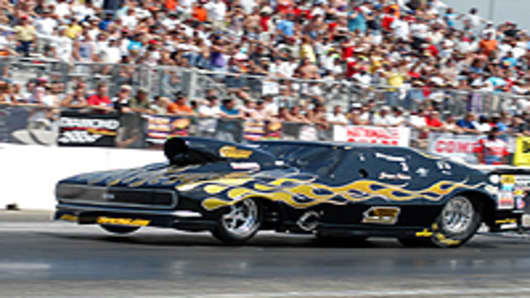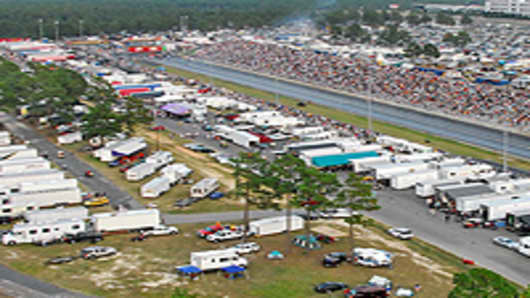Sports teams have been plenty creative during this rough economic time, but something they haven’t done is give away tickets.
Kenny Nowling thinks that, for some properties — including second-tier mixed martial arts organizations and the United Football League — that’s exactly how to make money. The story of how Nowling gave his product away to the fans for greater profits is the most unconventional money-making story in sports business this year. As president and CEO of the American Drag Racing League, Nowling was used to crowds of 3,000 people watching his organization’s races just four years ago.
- CNBC Slideshow - America's New Stadiums
Looking to shake things up, he came up with the idea of giving away the tickets for free so that he could sell sponsors on the size of his audience.
It worked.
Armed with freebies, Nowling said attendance to race weekends averaged 31,000 in 2007, 48,000 in 2008 and will likely be over 70,000 after this weekend’s world finals in Ennis, Texas — the final event in the 10-event yearly schedule.
Sponsors loved the fact that they’d be part of giving away the tickets, the huge crowds, the sampling environment and the demographic. The ADRL says the average age of their fan is 24 years old. The National Guard bought title sponsorship of the league and Hardee’s, Ford and Safety-Kleen, among others, agreed to be title sponsors of races.
This year, the league will gross $12 million, up from $6 million last year.
Not bad for a recession, huh?
Nowling said 85 percent of the revenue comes from sponsorship, 10 percent from merchandise sales and 5 percent from parking.
“Our product is our fan and the customer is our sponsors,” Nowling said.
You’ve heard all the stories about how NASCAR treats their sponsors better than any other sport, but they have nothing on the ADRL, whose league consists of a network of 300 licensed drivers.
Nowling recently had a meeting with a national company wondering if they should sponsor his league.
“They asked me what our demographics were and I told them they can be whatever they want them to be,” Nowling said. “And they looked at me like I was crazy. We target who are sponsors want us to target. If they want a stronger Hispanic demographic in the stands, we can hand out more tickets in Hispanic neighborhoods.”
With free tickets in hand, the ADRL doesn’t spend a dime on advertising. Six weeks before an event comes to town, they begin the process of handing out free tickets.
It comes with a catch.
Anyone who takes a free ticket has to give the league their name and address and has to opt-in on having communication with the league’s sponsors. Having a database of 600,000 people is only good if people give accurate information, of course.
“That’s not really a big problem,” said Nowling, whose says about 55 percent of the information they get from fans is accurate, a better hit rate than the norm. “If you incentivize people with something that’s free and good, they’re more likely to give you good information. That’s why credit card companies spend money on giving away those blankets and hats at the ballpark.”
The league relies on the fact that everyone who gets a free ticket isn’t showing up. So this weekend, for example, they’ve already handed out 800,000 tickets in hopes of breaking their two-day, 112,000-fan two-day record.
As teams deal with the new economy, they wonder how much they can lower their ticket prices without devaluing their product. They might be able to learn a thing or two from a drag racing league that gives their tickets away and makes it up by making money off selling their fans to sponsors better than anyone else.
Questions? Comments? SportsBiz@cnbc.com




